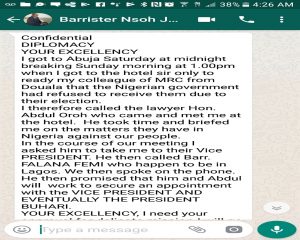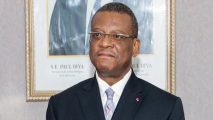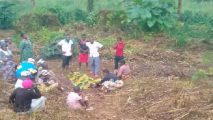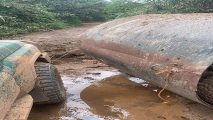28, June 2019
Pressmen and Press wars: Ambazonia’s Ray Baba takes on Dr David Makongo 0
Response to Dr. Makongo’s Appeal Note
Dear Dr. Makongo. I read your post on one of the fora to which I belong and felt compelled to address a few things.
While I share your pain and desperation for what our God-ordained revolution has been transformed into; I could not hold back on noting our collective contribution to the present quagmire. Of course, you are not exempted.
When the whole debacle was going down before, during and after the APNC stock-taking and Unity Convention in Philadelphia, voices like yours as well as the few journalists with large platforms instead of weighing in to steer public opinion to the right direction, either :
1) Sat on the fence , to avoid losing supporters/followers and to shield yourselves from surrogate criticism.
2) Avoided the topic completely by choosing to address other issues such as humanitarian assistance and the natural resources and minerals in Ambazonia.
3) Indirectly and subtly promoted the DIVISION knowingly or unknowingly , by supporting the now deposed Acting President Samuel Sako and promoting the idea of the existence of two IG in your posts and comments- thereby giving wings to the insuburdinate employee to fly higher in his resistance and gansterism against his boss.
You are part of those who contributed to the current mess we find ourselves in.
You mentioned Samuel Sako and heaped very flattering words , even attributing the success of the UNSC diplomacy to Sako.
Point of correction sir, throughout Sako’s entire tenure, the Southern Cameroons/Ambazonia revolution cannot count A SINGLE diplomatic success that can be attributed to Sako. Am sorry to disappoint you.
The lone attempt which came after a long period of diplomatic drought and unproductivity; was the UN Decolonization commission meeting . A scam propaganda which as crooket and unbalanced as the crutches it stood on, was hanging on a concocted string of lies and public manipulation.
We all later on learned, with video evidence that Sako, Ayim et al were trying to no avail to attend the meeting under the banners of the Sahawi Republic and some deeper-life-revival-inteceding-holy maria-Olumba-Olumba church , RESPECTIVELY.
Other than that, the only other achievement or “mischievement” was Chris Anus threats and calls to attack UN establishments, Elad’s wild and barbaric attacks on Comrade in arms Chris Mesner; and a whole lot of wasted flight money to fruitless missions.
Therefore, attributing and using Sako’s name in the same sentence with the UN Security Council just to stroke his ego in the right direction and make him feel good; does not only smack of dishonesty, but is equally an insult to the hardwork of the valiant , humble and dedicated comrades outside of the IG who toiled sleeplessly for it to happen.
In summary, Sako and his cabinet have not produced any tangible Diplomatic results to the best of my knowledge. His cabinet has instead ALIENATED PAST AND OTHER POTENTIAL PARTNERS.
The same unproductive report can be said in the domains of Humanitarian Assistance and to a greater extend, Self defence – an area where Sako’s cabinet excelled in, in terms of division of groups by buying fighters with lofty-empty promises and the elimination of opposing and /or defiant Generals.
With all due respect comrade Makongo,
I would have expected a senior comrade like yourself to use sound judgement, hindsight and foresight to inform your stance, then use your good offices to lobby the illogical camp to reason.
Let me break this point down further. Any sound person with wisdom and with an Ambazonia First mindset will understand that;
A) Promoting or supporting the defiance, anti-revolutionary gangsterism and power drunk actions of ” Acting President ” Sako, against the constitutionally elected President (now communicado, armed with a team of 10 cabinet members, and strategically re-routed to the dungeons of LRC through divine engineering to be the Nelson Mandela and face of our revolutionary quest as a high-profile international political prisoner) was a bad idea.
B) Political prisoners and ground fighters are untouchable, and very respected groups of people in a Revolution. Any attack against them is treasonous and counter revolutionary. No soldier or comrade left behind principle of revolutions.
C)The International community unanimously recognize Sisiku as the “leader of the Separatist movement”. As such, it is our responsibility to STRATEGICALLY use his image, position and location as a springboard to gather more international support towards our cause.
Instead, key voices like yourself chose to stay mute, failed to caution Sako and his cabinet against the dangers of his ignorant and overzealous actions ( Unfit to rule, Compromised, Impeachment ) and silently watched the way Sako’s surrogates and his Blue and white social media army of blind followers DISRESPECTED, INSULTED, DEMEANED, DISCREDITED Sisiku, the recognized face of the revolution and the Ambazonian political ticket to freedom.
These surrogates and the Blue and white army of doom did all these attacks under the watchful eyes and silence of Sako. Actually Chris and Sako promoted the attacks and basked in the glory of it. Chris Anu even went as far as calling VOA to announce the bad news of compromise and impeachment , while Ayim ( Professor of Sports turned diplomat) dispatched diplomatic letters to foreign partners.
GREED for money , THIRST for power and the desire to go down history as those who NEGOTIATED the freedom (or cheap sale) of Ambazonia , is what motivated this long string of misguided, foolish and destructive actions; result of which we are seeing today.
Are these guys Statesmen?
Are they really ordained men of God?
Are they Pastors or revolutionary vultures?
Helas! Sir Makongo, your silence and diplomatic posturing (fence-sitting) let to this.
I will not encourage Honorable Wirba to get himself involved in this charade. I will advise Hon. Wirba to keep his name clean by staying far away from this toxic and useless politics in the diaspora, promoted by “pastors” and journalists. It’s not worth it.
*Diaspora wuna finish wuna fufu of foolishness, blind surrogacy and Greed for Power
Ambazonians in the diaspora , if you continue on this path , you will lose any leverage you may have earned in the past to use as bargaining chip for your freedom. Silence in times of injustice and danger is criminal.
Soon, the next big even will occur in some part of the world and ALL ATTENTION will be taken away from the crisis in the Cameroons to elsewhere.
We can keep fighting each other and comparing an ” Acting Unknown to the world President ” with the internationally recognized Political Prisoner and “Leader of the Saparatist Movement”
J.N Foncha, Endeley, Albert Mukong , Dr. Kevin GUMNE et al. Must be spinning in their graves at this almost lost opportunity to right the wrongs of history.
Lastly, by peddling the Idea of two IG’s, Sir, you become part of the problem of division and not the solution.
Revolution are progressive and dynamic events. We make changes and keep going while those who lost their position seek other patriotic ways of moving the revolution forward in odifferent capacities.
Many have done so, including myself. We dont fight for power in a revolutiin in which there is no payment or salary.
True Revolutionaries step aside or resign to protect the bigger image of the cause. We are not LRC, we are Ambazonians, a people with integrity and wisdom.
Helas!
Its unfortunate that we have very academically educated Ambazonians with PhDs and Doctorates, but who are politically and strategically illiterate .
There are NO two IG’s. There is one IG headed by Sisiku Julius Ayuk Tabe- international political prisoner and leader of the Separatist movement who leads (advices) from jail, assisted by Yerima Dabney who rules ( runs the day to day business) the IG in his physical absence.
Ambazonia shall rise from these ashes of division, peddled and promoted by Musonge and LRC , with help of weak and financially greedy enablers disguised in Ambazonian outfits.
Long Live the 13 Counties of Ambazonia
Shortlived the Silent voices and enablers
Total Freedom or Resistance Forever.
Ambazonia First.
Ray Baba.
Revolutionary Vanguard.



























29, June 2019
Ambazonia: IG’s Press Statement on Humanitarian Dialogue Facilitated Talks/Negotiations in Switzerland 0
Since September 22, 2017, our communities have been subjected to some of the most ruthless and systematic assaults the international community have witnessed anywhere in recent history. Initiated to suppress peaceful demonstrations for fundamental rights.
Today we have more than 2000 of our fellow citizens killed, more than 80,000 in refugee camps in Nigeria and the UN reports more than 4.3 million of our people are affected by the conflict. A situation the UN described as one of the fastest growing human displacement crises in Africa.
This is no sports. That anyone should go show up somewhere and provide the lobbyist of Cameroon with signature and documents so they can derail efforts by serious countries like the US to get our case as a standalone Item on the Agenda of the UN Security Council is not just shameful but treasonous.
It is because of the importance of the situation that we questioned the seriousness of the Switzerland based Humanitarian Dialogue when they ignored the questions we sent to them in reply to their invitation for the said meeting.
So let me be as clear as I can on this. NO I did not attend this meeting with Humanitarian Dialogue. And, no one from my team and our leadership behind bars led by President Sisiku AyukTabe attended that meeting. We had no representative there. Let me repeat this again. The one thing that we learnt from the Anti-apartheid struggle is that leadership behind bars is the sole target of any honest effort at negotiation.
The Cameroun government has thus far refused to do the bare minimum required for confident building towards any real negotiations. Which is: 1. To stop violating the inalienable rights of the people you hope to negotiate with; and 2. To allow an international independent Fact Finding Mission to establish the facts on the ground and to stop the killings.
We have heard the calls for dialogue without preconditions. These are not preconditions. They are trust building mechanisms we have seen deployed in most conflicts in the past several decades with relative success in reducing tensions, from East Timor, Sri lanka to Myanmar.
What does it mean to tell us to go into some room to have Talks/Negotiations with a Cameroun regime which has twice refused the Office of the UN High Commissioner for Human rights access to investigate credible reports of international crimes?
What does it mean to tell us to go and have Talks/Negotiations with a Cameroun regime that continues to slaughter our people as we speak?
If Humanitarian Dialogue is serious about facilitating Talks/Negotiations and the Swiss government is serious let them tell Cameroun to Stop the killings, release all our political prisoners, who are being held in violation of their fundamental human rights, allow an independent international fact finding mission to establish the facts on the ground like in all other recent conflicts. But more importantly Humanitarian Talks/Negotiations should go to Kondengui prison and discuss with our leaders there about their plans for dialogue.
Again these are not preconditions. They are confidence building procedure. I will say this though. As far as this struggle is concerned.
It shall be Total Independence or Resistance Forever.
Yours truly,
Dabney Yerima Vice President
– Federal Republic of Ambazonia